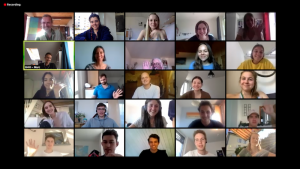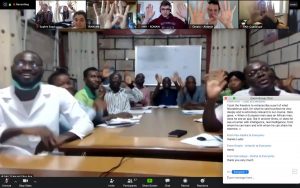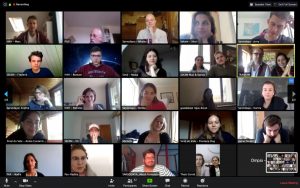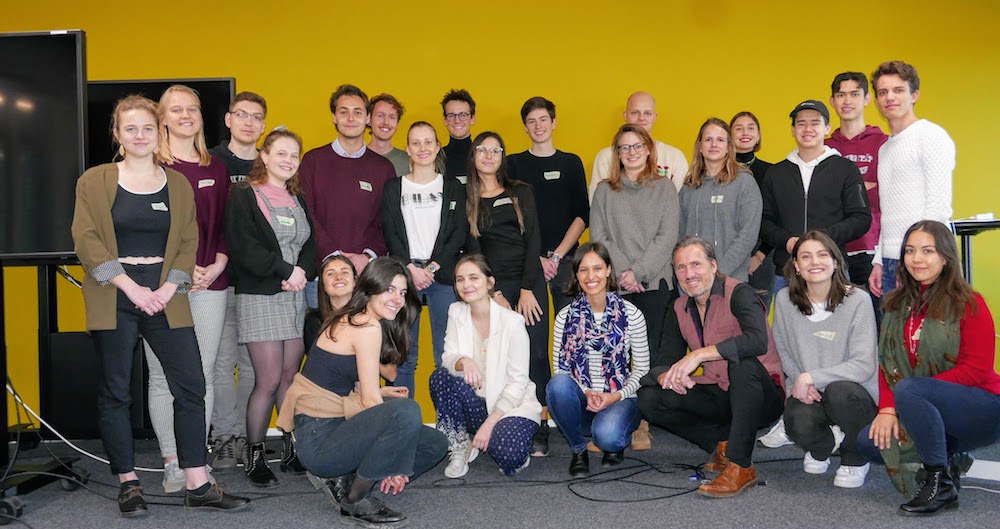From the beginning, the course was geared, in parallel, towards introducing participants into TRANS4M’s integral approach to development, as well as to actively expose them to pioneering cases of integral development across five continents.
- Pax Herbals, Nigeria (and Pax Africana)
- Sinal do Vale, Brazil (and the Agents of Transformation School)
- Sarvodaya, Sri Lanka (and the SIHL Sarvodaya Institute for Higher Learning)
- Sekem, Egypt (and the Wahat Learning Farm and SekemSophia Program)
- Ompio Campus, Italy (and Integral Learning Field)
- Home for Humanity, France (and Trans4m, Switzerland)
These six cases from five continents, that were coming together in this course, catalysed by Trans4m and Home for Humanity, are all renowned Pioneers of Integral Development, each with ample experience in hosting young changemakers. The focus and objective, then, of this course, was to translate the integral development approach into “Manuals for Integral Learning-to-Innovation Journeys for Aspiring Agents of Transformation”.
All pioneer organisations see such innovative learning journeys in the practice field of integral development at the heart of the education for the future. Each of the pioneer organisations is in the process of building alternative educational institutions, learning processes and curricula, to make such future “education” a reality. The Manuals, developed by the students together with local case teams, fed directly into this process!
The six groups of students created not only comprehensive Manuals for each of the participating cases, enabling future Changemakers to navigate their learning-to-innovation journeys; they also developed a supportive video.
 Due to the COVID Crisis, the entire course, except the opening session at the University of St. Gallen had to take place online. However, we managed to develop a close-knit “transformative learning community”, that delivered excellent and practically relevant results not only for the case organizations, but also for future generations of agents of transformation. Also the co-engagement between the participating pioneer organizations and the students went fabulously, and in the many weeks after the online course intensive, students developed remarkable manuals and videos.
Due to the COVID Crisis, the entire course, except the opening session at the University of St. Gallen had to take place online. However, we managed to develop a close-knit “transformative learning community”, that delivered excellent and practically relevant results not only for the case organizations, but also for future generations of agents of transformation. Also the co-engagement between the participating pioneer organizations and the students went fabulously, and in the many weeks after the online course intensive, students developed remarkable manuals and videos.
 Here is a review of the course and team work by Father Anselm Adodo, the founder of Pax Herbals in Nigeria, one of the Case organizations: “The PAX-ST.GALLEN project on Integral transformation was truly transformative in the real sense. I was impressed by how the Pax Team, which comprises Polytechnic and University students and career staff at Paxherbals worked together and interacted with the team from St Gallen. First, I noticed a shift from the conventional teacher-student relationship where the teacher divulges information for the students to memory and digest, and then wait to give the ideas back to the teacher when the examination comes. However, in this project, the students were involved in the process of explaining, redefining and assimilating the ideas, therefore making them co-creators in knowledge generation. Second, the constant zoom interaction between the Team in France/Geneva and the team in Nigeria is an excellent example of the positive and creative use of modern technology in education. Technology is helping us to create a new sense of HOME, a place that transcends physical distance, race, gender and culture. In this project, it seems that even the idea of transformation itself has been transformed! Finally, the students were able to produce a beautiful video and a manual to document their transformation journey. With this, they remind us that education is what takes place in full embeddedness in the life-world of one’s immediate environment. Contrary to what many may think, such immersion in one’s local existence expands one’s horizons towards global perspectives. After all, there is no separate air for men and women, rich people and poor people, white people or black people: we all breath the same air. We are all locally global! An incredible and transformative journey this has been!”
Here is a review of the course and team work by Father Anselm Adodo, the founder of Pax Herbals in Nigeria, one of the Case organizations: “The PAX-ST.GALLEN project on Integral transformation was truly transformative in the real sense. I was impressed by how the Pax Team, which comprises Polytechnic and University students and career staff at Paxherbals worked together and interacted with the team from St Gallen. First, I noticed a shift from the conventional teacher-student relationship where the teacher divulges information for the students to memory and digest, and then wait to give the ideas back to the teacher when the examination comes. However, in this project, the students were involved in the process of explaining, redefining and assimilating the ideas, therefore making them co-creators in knowledge generation. Second, the constant zoom interaction between the Team in France/Geneva and the team in Nigeria is an excellent example of the positive and creative use of modern technology in education. Technology is helping us to create a new sense of HOME, a place that transcends physical distance, race, gender and culture. In this project, it seems that even the idea of transformation itself has been transformed! Finally, the students were able to produce a beautiful video and a manual to document their transformation journey. With this, they remind us that education is what takes place in full embeddedness in the life-world of one’s immediate environment. Contrary to what many may think, such immersion in one’s local existence expands one’s horizons towards global perspectives. After all, there is no separate air for men and women, rich people and poor people, white people or black people: we all breath the same air. We are all locally global! An incredible and transformative journey this has been!”
Videos of the students will soon be on display.
A big thanks to Titus Palivan, Pius Leutenegger and Junior Fellow Stefanie Kriech for supporting this course so effectively!
Stay tuned.


